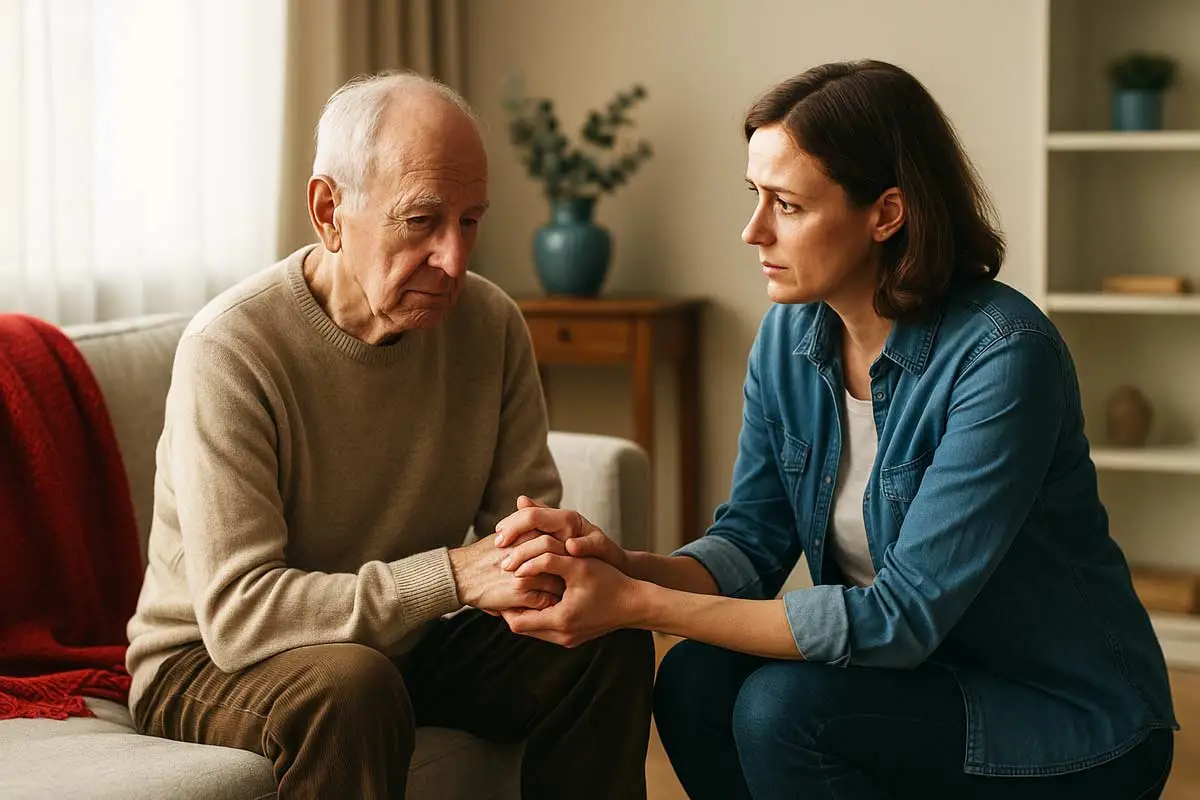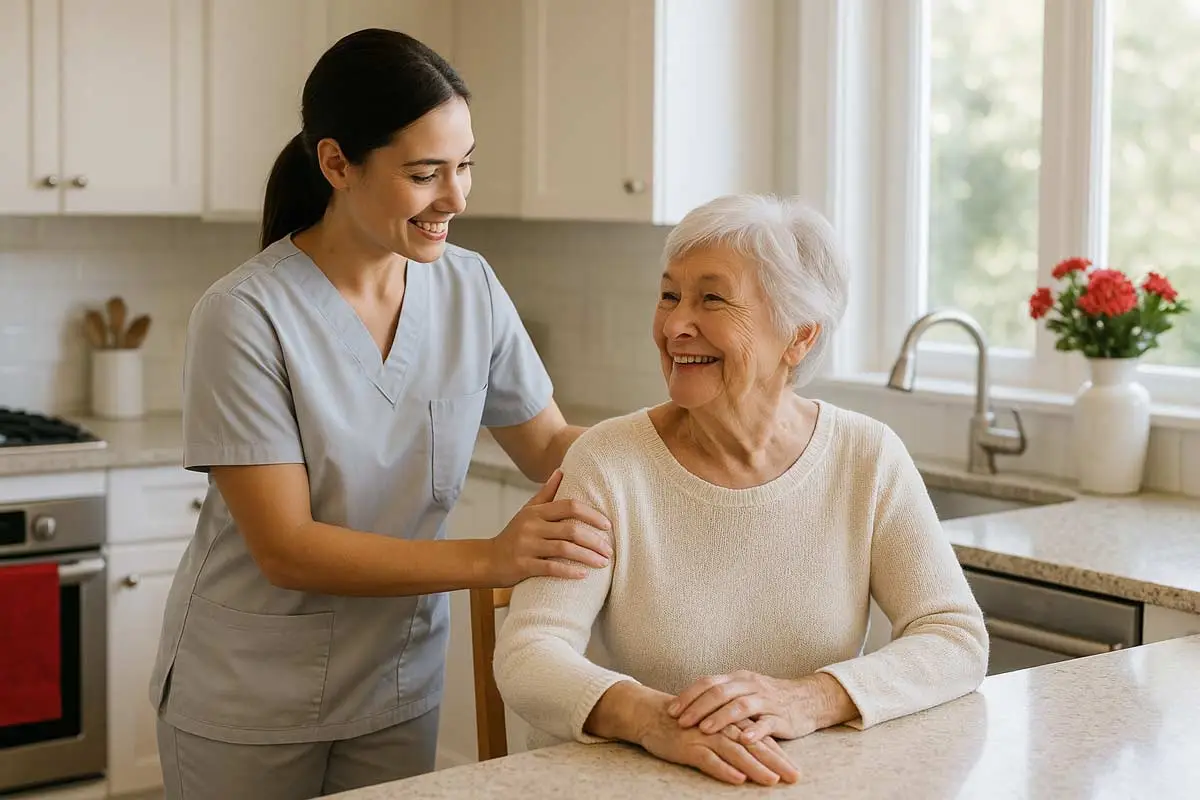
A daughter offers comfort to her aging father at home — a tender reminder of when it may be time to consider compassionate in-home care.
Table of contents
Show moreShow less- The Growing Need for In-Home Care
- Why It’s Hard to Spot the Signs
- 1. Noticeable Weight Loss or Frailty
- 2. Difficulty Standing, Walking, or Climbing Stairs
- 3. Unexplained Bruises or Falls
- 4. Forgetfulness That Affects Safety
- 5. Confusion with Time, Dates, or People
- 6. Signs of Depression or Mood Swings
- 7. Neglecting Personal Appearance
- 8. Wearing the Same Clothes for Days
- 9. Unclean Living Spaces
- 10. Missed Medications or Wrong Dosages
- 11. Ignoring Doctor’s Orders
- 12. Withdrawing from Social Activities
- 13. Isolation and Loneliness
- 14. Difficulty Managing Daily Tasks
- What Happens If These Signs Are Ignored?
- How In-Home Care Can Help
- When to Start the Conversation
- Final Thoughts
- Frequently Asked Questions
Aging happens quietly. One day everything seems fine, and the next, you're wondering if Mom's forgetfulness is more than just “a senior moment.” If you’ve been second-guessing whether your loved one is coping well at home, you're not alone. Let’s uncover the red flags that signal it may be time to consider in-home care.
The Growing Need for In-Home Care
America is aging — fast. With seniors preferring to age in place, more families are turning to in-home care as a compassionate, affordable, and effective solution. But when do you know it's the right time?
Why It’s Hard to Spot the Signs
It’s easy to chalk up memory lapses or fatigue to just getting older. But subtle changes can be the early whispers of larger issues. Paying attention now can prevent crisis later.
1. Noticeable Weight Loss or Frailty
If your loved one looks thinner or seems frail, they may not be eating well. This can stem from difficulty cooking, depression, or underlying medical conditions. In-home caregivers can ensure they’re eating balanced meals.

A caring home aide helps a senior woman enjoy her morning routine — showcasing the warmth and reliability of quality in-home care services.
2. Difficulty Standing, Walking, or Climbing Stairs
Mobility changes don’t always come with a cane. Watch for signs like holding onto walls or hesitating before taking steps. These are major fall risks and a serious red flag.
3. Unexplained Bruises or Falls
Bumps and bruises can be brushed off — literally. But consistent signs of injury may point to falls, accidents, or dizziness that go unreported due to fear or embarrassment.
4. Forgetfulness That Affects Safety
Forgetting where the keys are is one thing. Forgetting to turn off the stove is another. Missed appointments, duplicate purchases, or wandering are serious signs of cognitive decline.
5. Confusion with Time, Dates, or People
Do they seem lost in conversations? Repeating stories? Mixing up grandchildren’s names or days of the week? These may be early signs of dementia or Alzheimer’s disease.
6. Signs of Depression or Mood Swings
Seniors may become irritable, withdrawn, or unusually quiet. A loss of interest in favorite hobbies or frequent sadness could indicate depression — a common but underdiagnosed issue in older adults.
7. Neglecting Personal Appearance
If your loved one has always been meticulous but now skips grooming, bathing, or wearing clean clothes, it may mean they’re struggling with daily tasks or motivation.
8. Wearing the Same Clothes for Days
This may not be a fashion choice. It’s often due to difficulty doing laundry, remembering to change, or managing fasteners like buttons or zippers.
9. Unclean Living Spaces
Clutter, dirty dishes, laundry piles, or expired food in the fridge are strong indicators that housework is becoming overwhelming.
10. Missed Medications or Wrong Dosages
Managing multiple prescriptions isn’t easy. If you spot full pill bottles, confusion about timing, or duplicates — your loved one could be at serious risk.
11. Ignoring Doctor’s Orders
Have they skipped follow-ups or refused treatments? This could signal confusion, denial, or fear — and professional help might be the buffer they need.
12. Withdrawing from Social Activities
Social isolation is a hidden danger. If your loved one suddenly avoids phone calls, outings, or church, it could reflect fear of embarrassment or the onset of depression.
13. Isolation and Loneliness
Living alone can take a heavy emotional toll. If you hear them say they feel forgotten or lonely, this isn’t just emotional — it affects physical health too.
14. Difficulty Managing Daily Tasks
Are bills stacking up? Is food spoiling in the fridge? Are appointments missed? These little cracks in routine can snowball into safety hazards without support.
What Happens If These Signs Are Ignored?
Waiting too long to intervene can lead to hospitalizations, rapid mental decline, or dangerous accidents. Families often wish they had acted sooner. Prevention is always less painful than reaction.
How In-Home Care Can Help
Personalized Support
In-home caregivers tailor their services: from meal prep and mobility help to companionship and medication reminders. It’s like having a caring assistant dedicated to your loved one’s independence. Learn more about the advantages of in-home care and how it empowers aging adults.
Peace of Mind for Families
You can’t always be there — but someone else can. In-home care brings peace of mind, knowing your loved one is safe, seen, and supported.
When to Start the Conversation
Start small. Express concern, not control. Emphasize independence, not limitation. Use phrases like “Would it help if…” or “I noticed you’ve been…” to open the door gently.
If you're unsure how to begin, here’s a guide on how to qualify for home care that can help you assess options first.
Final Thoughts
Recognizing the signs that your loved one may need help is an act of love, not betrayal. With in-home care, they can stay where they’re most comfortable — at home — while staying safe and supported. Don’t wait for a crisis. Be proactive. You’ve got options, and help is only a phone call away. Discover how personal care services can transform your loved one’s daily routine and enhance their well-being.
Looking for family caregiver or home care services in Philadelphia? Contact Supreme Homecare today to discover how our compassionate team supports families and helps loved ones live safely, comfortably, and with dignity at home.


